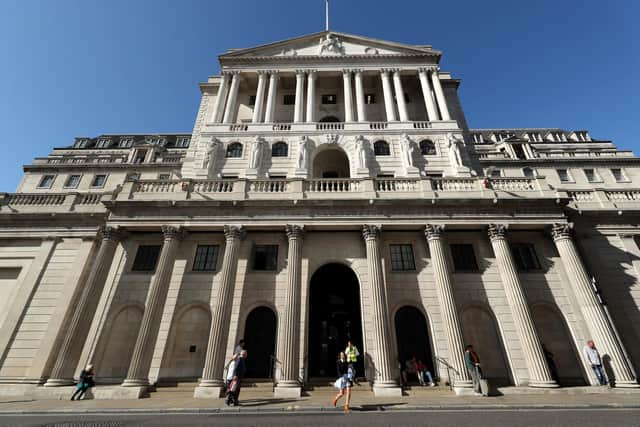The small rate rises that can bring mortgage payment pain - Sarah Coles
With inflation on the march, they were under pressure to do something, and with a mountain of data suggesting economic growth is hitting the skids, they couldn’t go overboard: so we had another small bump.
These small, incremental rises don’t feel particularly life-changing, so it’s easy to assume this isn’t something for you to worry about it.
Advertisement
Hide AdAdvertisement
Hide AdHowever, they’re starting to add up, especially if you have a mortgage.


If you’re one of the 1.1 million people on a standard variable rate mortgage, or one of the 850,000 with a tracker, you’ll be well aware of the impact, because you’ll have seen your rate rise already. Halifax hit the headlines this week for accidentally managing to announce its variable rate rises before the Bank of England meeting, which was speedy even by the standards of the banks.
If you’re one of the three quarters of mortgage-holders who are on a fixed-rate deal, it may not mean terribly much to you right now. However, while a fixed-rate deal protects you for as long as it lasts, it also means you experience all of the rate rises in one big jump when the deal expires.
Take someone with a mortgage of £250,000 over 25 years, if they took out a mortgage at the average two-year fixed rate of 2.29% in March 2020, they’d be paying £1,095 a month. However, if they shopped around and fixed in April this year (with their debt having fallen to £235,000 and their term to 23 years), they’d be charged an average of 2.72%, and be paying an average of £1,146 – or £51 more.
Advertisement
Hide AdAdvertisement
Hide AdLast month we asked people how much their mortgage would have to increase before it started causing problems for their finances, and one in ten people said an increase of up to £50 would be problematic – which rose to 14% among women.
If you factor in this week’s rate rise, assuming it’s passed on in full, that would take the monthly cost to £1,176 – or £81 more. The same survey showed that one in three people would face financial problems if their mortgage bill rose by between £50 and £100 a month.
Unfortunately, this is unlikely to be the last of it. Forecasting future rate rises is a notoriously unreliable business, but if we were to factor in a rise to 1.5%, and feed that directly into mortgage costs, the monthly payments could rise to £1,238 – or £143 more than March 2020. Our research shows that this would mean that two thirds of mortgage holders would start to find life difficult.
Of course, we can’t know exactly what rate rises are going to mean for each of us personally, because every single part of this calculation is unknowable. We don’t know how much rates will rise, and we don’t know how they will feed into mortgages.
Advertisement
Hide AdAdvertisement
Hide AdMeanwhile, you can’t be sure of the best possible rate available to you personally at the time you come to hunt for a deal. All we know is that deals aren’t going to be any cheaper, and could be much more expensive.
If you have six months or less left on your current mortgage deal, you can secure a remortgage rate today, and protect yourself from any rises between now and when it runs out.
If you have a bit longer until your fix comes to an end, it’s worth considering what you’ll do when it happens. In an ideal world, you will still have the wiggle room in your budget to cut back costs elsewhere or cut out some inessential spending, in order to free up enough cash to cover the difference.
Even if you’ve cut your costs as far as feels possible, don’t rule out bigger lifestyle changes that could bring your budget back under control.
Advertisement
Hide AdAdvertisement
Hide AdYou may even be able to make those compromises now and overpay on your mortgage, which will keep a lid on rises later. If you do opt for overpayments, make sure that your mortgage deal allows them without imposing a penalty.
If there’s no more room in your budget for these extra costs, then consider your circumstances more closely.
Even if rates overall have risen, you might qualify for a cheaper deal if your financial position has improved. If the value of your home has increased substantially, for example, you may have enough equity in it to qualify for a better mortgage rate.
Likewise, years of sensibly paying the mortgage may have boosted your credit score so that better deals are available.
Advertisement
Hide AdAdvertisement
Hide AdIf none of these apply, you may be able to change the nature of your mortgage. Depending on your age, you may be able to extend it over a longer period, so your monthly payments are still manageable.
However, you need to appreciate that this comes at a cost, because you’ll be paying your mortgage for longer, so will end up covering more interest.
You’ll also be eating into the time when you’ve paid off the mortgage and can prioritise other things – like your pension – so you need to understand what you’re giving up.
None of these feel like brilliant options, but if you give yourself the time and space to explore them now, and possibly speak to a mortgage broker, then you can put a plan in place to ensure you can afford your mortgage when you’re no longer protected by your fixed rate deal.
Sarah Coles is a personal finance analyst at Hargreaves Lansdown
